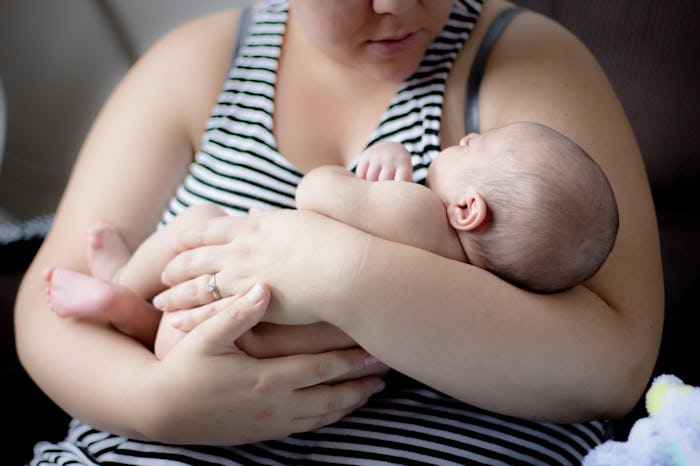Life

The First 3 Postpartum Months Require More Sleep
When you initially find out that you're pregnant, one of the only things you think you know for certain is that postpartum life will most likely be a fairly sleepless one. You've seen friends and family members become new parents and, in turn, become bleary-eyed and exhausted. So you're (somewhat) mentally prepared for the lack of sleep you feel sure is imminent. Although the exact requirements tend to vary person to person, there isa certain amount of sleep you actually need in your first three months postpartum, when sleep deprivation and (or) new-parent insomnia can be at its worst as both you and your baby adjust to a brand-new version of daily life.
According to Parents, newborns sleep differently than adults. Infant sleep patterns allow babies to sleep for shorter periods more often and wake up more easily than adults, which is why it's not uncommon for parents of infants to suffer from sleep deprivation. But even beyond the sleep disruptions caused by your sweet newborn, it's completely natural and normal for new mamas to feel fairly lethargic and fatigued. According to an article on Baby Center, given that your body is recovering from childbirth, exhaustion is part of the childbirth recovery process. This makes sense though. When you're sick, for example, you often feel zapped of energy, partially because your body is fighting off disease and trying to recuperate and heal. The same principle applies after childbirth.
So how much sleep do you really need in the fourth trimester? Ultimately, it depends on what's normal for you. Say, for instance, you normally need about seven to nine hours of sleep per night. Your body and mind will still need those hours. But after giving birth, you may find that you need more in order to feel truly rested. According to a study published in the Journal of Perinatal and Neonatal Nursing, parents of breastfed infants sleep about 40 to 45 minutes more each night than parents of infants who are formula-fed. If you're not sleeping enough, it's important to note that getting only five to six hours of sleep per night makes you 1.9 times more likely to get in an accident, according to the AAA Foundation for Traffic Safety. If you're getting even less than that, the risk is even higher.
Although it might seem like there's simply no way to fit more sleep in your day, therapist Dr. Diana Lynn Barnes told Parents that resting on the couch for half an hour can help restore some of your energy, even if you can't fall asleep during that time. Additionally, sleep specialist Dr. Margaret Park told WebMD that talking to your partner about your personal sleep needs before the baby comes can help the two of you make a plan to make sure you get the sleep you need. Looping family, friends, or hired care in to the conversation can help with continuity, as well.
If you're getting enough sleep at night, but still find yourself perpetually exhausted, it could be a sign of postpartum depression, anemia, or a thyroid condition, so it's important to speak with your healthcare provider if you're concerned. Keeping an eye on how much rest you're getting — and making sure both you and your partner are getting enough — is important not only for your physical, mental, and emotion wellbeing, but for the care of your new baby. The fourth trimester can be a bit overwhelming, but prioritizing rest and sleep, if possible, can make it a little bit more bearable.